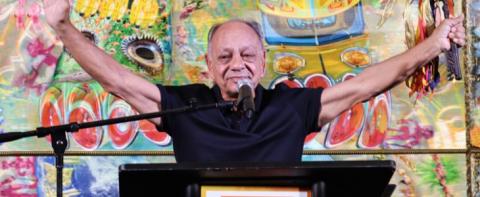<p></p>
<p><!-- /wp:paragraph --><!-- wp:paragraph --></p>
<p>RIVERSIDE, CA — During the five years it took Richard “Cheech” Marin, who played half of the 1970s comedic duo <a href="https://www.cheechandchong.com/">Cheech and Chong</a>, to work out the kinks of what it takes to have his own art museum, he looked for a “sign.”</p>
<p><!-- /wp:paragraph --><!-- wp:paragraph --></p>
<p>A spiritual symbol more than anything, he said he waited for something that would validate the efforts behind his project: the remodel of a building once known as the Riverside Public Library into a two-story museum he would nickname <a href="https://riversideartmuseum.org/visit/the-cheech-marin-center-for-chican…;“The Cheech,”</a> short for the Cheech Marin Center for Chicano Art and Culture.</p>
<p><!-- /wp:paragraph --><!-- wp:paragraph --></p>
<p>There, hundreds of pieces of Chicano art he has collected over 40 years are set to reside on rotation, making it the largest and first collection of the category in the world — a partnership between the Riverside Art Museum (RAM), Marin, and the City of Riverside, the “City of Arts & Innovation,” with a price tag of $14.5 million.</p>
<p><!-- /wp:paragraph --><!-- wp:paragraph --></p>
<p>At a recent press conference in Riverside leading up to the public unveiling of his final masterpiece on June 18, Cheech shared the one sign he had been looking for all along. </p>
<p><!-- /wp:paragraph --><!-- wp:paragraph --></p>
<p>When he learned the size of his new museum was measured at 61,420 square feet, the answer came to the light in a three-digit number. </p>
<p><!-- /wp:paragraph --><!-- wp:paragraph --></p>
<p>“61,420…four, twenty,” he said looking up into the sky with his arms raised, “420. That was my sign. I wish the building’s number was 420.”</p>
<p><!-- /wp:paragraph --><!-- wp:paragraph --></p>
<p>The room filled with hysteria, a true effect of Cheech’s cannabis-focused comedic approach and laid-back nature showing that while his museum is rich in serious, historical material of Chicano culture, art, at the end of the day, is meant to elicit a reaction. For him, that could mean laughter.</p>
<p><!-- /wp:paragraph --><!-- wp:paragraph --></p>
<p>Through the Cheech, Marin’s legacy is evolving from being a comedian known for his stoner jokes, to a community-involved art collector who is gifting 500 pieces by Chicano artists including Judithe Hernández, Sandy Rodriguez and John Valadez to the RAM.</p>
<p><!-- /wp:paragraph --><!-- wp:paragraph --></p>
<p>Cheech’s art collection, which spans four decades, began in the 1980s, and succeeds his past groupings of items like baseball cards and marbles. His collecting habits were born in south central Los Angeles, where Mexican-Americans advocated for social justice during the Chicano Movement or El Movimiento. </p>
<p><!-- /wp:paragraph --><!-- wp:paragraph --></p>
<p>In 2001, Cheech debuted a part of his collection in his first exhibition, <a href="http://www.petercornwell.com/cheechmarin/chicano-visions/">Chicano Visions: American Painters on the Verge</a>, a six-year tour at museums across 15 cities in the United States. Since then, more than a dozen other showings from the Cheech Marin Collection under the direction of Melissa Richardson Banks have toured art museums across the country and in Europe. </p>
<p><!-- /wp:paragraph --><!-- wp:image {"align":"center","id":55781,"sizeSlug":"full","linkDestination":"none"} --></p>
<p><img alt="" src="https://cms.laprensa.org/sites/default/files/2022/06/pic_cheechgallery…;
<p><!-- /wp:image --><!-- wp:paragraph --></p>
<p>An homage to his own experience as a Chicano, the works that now cover the walls at the Cheech render an image of how the art collector identified with the movement years back and maybe even continues to do so today. </p>
<p><!-- /wp:paragraph --><!-- wp:paragraph --></p>
<p>“The paintings in this collection remind me of my upbringing,” Cheech said.</p>
<p><!-- /wp:paragraph --><!-- wp:paragraph --></p>
<p>An upbringing in which he struggled with identity having been raised in a part of Los Angeles where one day “everyone was black” and then white, the next. </p>
<p><!-- /wp:paragraph --><!-- wp:paragraph --></p>
<p>“How does this work?” Cheech said he asked himself. </p>
<p><!-- /wp:paragraph --><!-- wp:paragraph --></p>
<p>It is through paintings on display like “East LA-Cesar Chavez Ave. & Lorena St.” by Roberto Gutiérrez that depict the everyday life and culture of people in between two cultures like Cheech, some transporting produce in trucks, others forming part of presumably mariachi bands, standing on busy streets wearing sombreros. </p>
<p><!-- /wp:paragraph --><!-- wp:paragraph --></p>
<p>Marin’s contribution to the Inland Empire made him tear up at the conference just moments after being presented with a key to the city of Riverside by Riverside Mayor Patricia Lock-Dawson, an event captured in front of a lenticular work of art by the de la Torre Brothers that was commissioned by the Cheech museum.</p>
<p><!-- /wp:paragraph --><!-- wp:paragraph --></p>
<p>“I want them (young Chicanos) to know that it's possible for their art to hang in the museums and represent the community,” he said. “I didn't even dream that because it was an impossible dream for me…but…things like this can happen.”</p>
<p><!-- /wp:paragraph --><!-- wp:paragraph --></p>
<p>The Cheech will open to the public on June 18 and is located at 3581 Mission Inn Ave., Riverside, CA, 92501.</p>
<p><!-- /wp:paragraph --></p>
